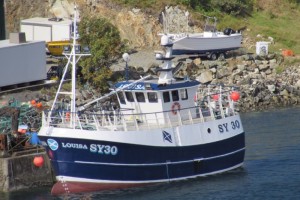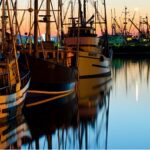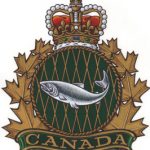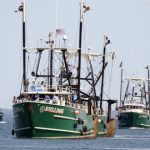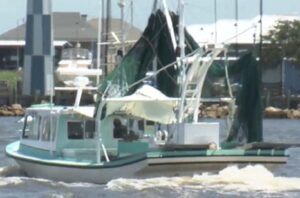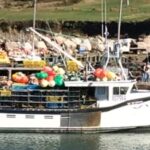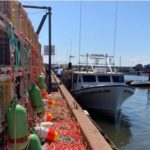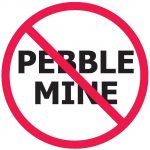Tag Archives: Whales
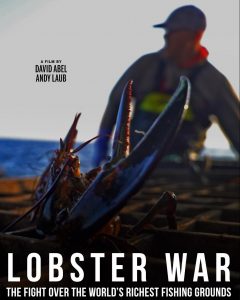
Letter: More awareness needed of fish farms
To the editor: I went to the screening of “Lobster Wars” that occurred at the Cape Ann Museum on June 4. In the panel discussion after the movie, Larry Stepenuck was the only one who brought up the devastating effects and disturbances on the lobstermen and fishermen by the fish farms. These polluting enterprises and associated infrastructure take out huge chunks of the ocean that the fishermen and lobsermen could otherwise fish in (both vertically and horizontally). What’s left is getting slimmer all the time. Here, NOAA wants the lobstermen to develop ropeless lobster traps in order to protect the right whales. Meanwhile, NOAA and the Army Corps of Engineers turned around last year and awarded one of the Saltonstall-Kennedy grants to the development of a fish farm in the Critical Zone. A must read by Sue Waller, Rockport. >click to read<14:13
60-Day Notice of Intent to Sue NOAA under the Endangered Species Act Regarding Sea Grant’s Funding of Offshore Aquaculture Projects – >click to read<
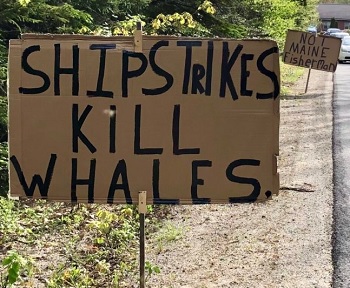
Lobstermen at state hearing wary of regulations to protect whales
“Behind the scenes, they all say exactly the same thing,” Horner, the chairman of the local lobster zone council, said at a state hearing on new right whale protection regulations. “Fishermen could accept (a trap cut), I think, but not if we are going to have more people coming in to fill the gap, especially those from outside.” The Maine Department of Marine Resources kicked off a monthly series of public information sessions on the new whale rules Tuesday. More than 100 lobstermen from the local zone, which runs from Franklin to Frenchboro, turned out.>click to read<11:47
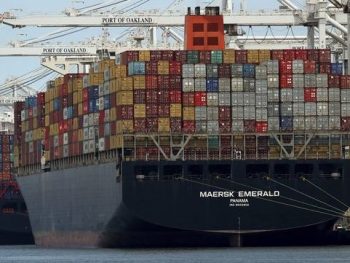
Whales are facing a deadly threat along West Coast: container ships
One day last May, a container ship entered the San Francisco Bay with extra cargo. A 45-foot-long dead female fin whale was draped across the ship’s bow. The impact with the ship had broken her back, ruptured her organs and caused severe internal bleeding. Ten whale deaths were attributed to ship strikes in 2018 – the highest number on record in California since NOAA Fisheries began tracking in 1982. The mortality rate represents an enormous increase from the average 3.4 ship strike victims recorded annually in the five previous years. Five of the 10 whales that died with boat collision injuries in 2018 were endangered or threatened fin, blue and humpback whales. >click to read<15:29
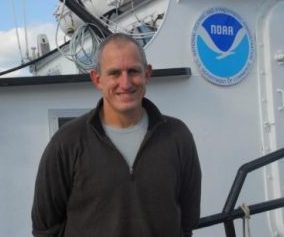
DON CUDDY: Whales, fish stocks and new tech: Catching up with NOAA’s Jon Hare
I was pleased to enjoy a wide-ranging chat with Mr. Jon Hare last week. Jon is the Science and Research Director for NOAA’s Northeast Fisheries Science Center in Woods Hole. That’s the division of NOAA that is charged with managing “the living marine resources of the Northeast Continental Shelf Ecosystem from the Gulf of Maine to Cape Hatteras.” So this man has a lot on his plate. When he began working as director in 2017 I interviewed him about the task ahead and did a follow up last year. So in what has now become an annual event we sat down to talk about how things are going at the Science Center and I found the encounter as interesting as ever. >click to read<18:40
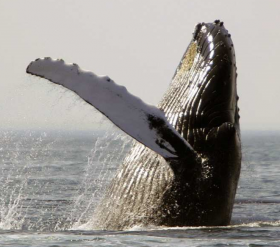
Whales and fishermen caught in turf war over California’s coast
As rising ocean temperatures move their food supplies closer to shore, a staggering number of migrating whales have been forced into the path of California’s crab fishing fleet — and the confrontations have increased dramatically over the last five years. State agencies have tried and failed to keep whales out of crab gear, prompting one nonprofit to take matters into its own hands.,, Some fishermen see this lawsuit as another nail in the coffin for California’s Dungeness crab fishery. >click to read< 09:20
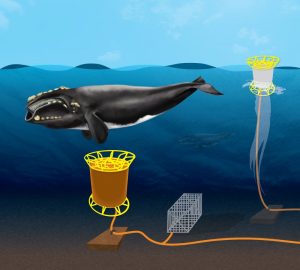
Cape Cod environmentalists plan to wreck their lobster Industry to save the whales
Scientists trying to convince New England lobstermen to invest in “ropeless fishing” to cut the risk current fishing methods pose to northern right whales, The Boston Globe reported. Scientists at the Woods Hole Oceanographic Institution say ropeless fishing will allow lobstermen to continue in their livelihood, but without long ropes running from buoys on the ocean’s surface to lobster traps on the ocean floor.,,, Scientists warn if this technology is not pursued, the only other option to save the whales is government regulation of fishing seasons and areas, which would devastate the industry much more than ropeless fishing. >click to read< 09:07
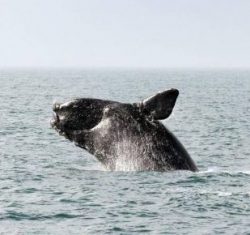
Pro-Active – P.E.I. snow crab industry figuring out how to protect endangered whales
Fisheries experts are on a tight timeline to figure out changes to the snow crab fishery to protect endangered right whales in the Gulf of St. Lawrence before the 2018 seasons starts. The season opens in April — including 35 Island fishermen landing about $14 million dollars worth for the Island. Fisheries and Oceans Canada (DFO) wants feedback from fishing groups in the next two to three weeks. Industry and DFO officials met in Moncton Wednesday to discuss possible solutions. One of the ideas was starting fishing earlier so fishermen could possibly reach their quota before whales arrive. click here to read the story 19:17
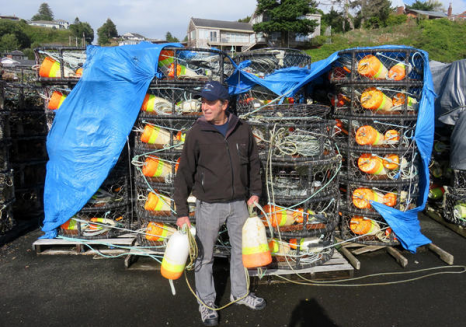
Fishermen: ‘We want to be proactive’ – Making The Sea Safer For Whales
More than 30 times this year, the federal government has received reports of whales tangled in fishing gear along the West Coast. Sometimes the whales manage to wriggle free. Other times you see heart-rending pictures on the news or a rescue mission. The culprit often involves Dungeness crab pot lines. Now Oregon crabbers are working with marine scientists to make the seas safer for whales and to avoid a black mark on their brand. Bob Eder has fished commercially out of Newport, Oregon for decades. “Over 45 years of pulling crab pots—I think I’ve probably hauled in close to a million—I’ve never encountered an entangled whale,” he said. ‘We want to be proactive’ click here to read the story 09:03
Temporary closure of a fishery can help whales and fishermen, biologist says
 As right whale researchers shift their focus to the Gulf of St. Lawrence, they welcome a decision by the federal government to close a snow crab fishery early after seven whales and a whale rescuer died. Sean Brillant, a senior conservation biologist with the Canadian Wildlife Federation based in Halifax, said he recently proposed a similar strategy to protect right whales that would restrict fishing during the summer in the Grand Manan Basin in the Bay of Fundy and the Roseway Basin on the Scotian Shelf. Brillant said said fishermen’s landings have reportedly declined in recent years, so the impact on them would be minimal. click here to read the story 08:13
As right whale researchers shift their focus to the Gulf of St. Lawrence, they welcome a decision by the federal government to close a snow crab fishery early after seven whales and a whale rescuer died. Sean Brillant, a senior conservation biologist with the Canadian Wildlife Federation based in Halifax, said he recently proposed a similar strategy to protect right whales that would restrict fishing during the summer in the Grand Manan Basin in the Bay of Fundy and the Roseway Basin on the Scotian Shelf. Brillant said said fishermen’s landings have reportedly declined in recent years, so the impact on them would be minimal. click here to read the story 08:13
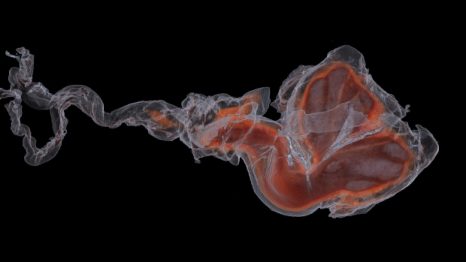
Researchers probing marine mammal genitals, copulation with simulated sex!
Dara Orbach is probably one of very few people in the world who regularly gets sent dolphin vaginas in the mail. “The boxes don’t usually smell very good when they arrive,” says Orbach, a post-doctoral fellow at Dalhousie University and a research assistant at Mount Holyoke College in Massachusetts. The marine mammologist has spent the last few years studying the genitals of whales, dolphins, porpoises, sea lions and seals to understand how they fit together during sex. It’s not an easy thing to do. First, she has to actually obtain the animals’ vaginas and penises. Orbach has a permit to receive the reproductive organs of marine mammals that have died of natural causes after a necropsy has taken place. It has taken her years, but at its peak, her collection included about 140 specimens. Second, she has to figure out how the penises and vaginas interact in real life when, in fact, they’re lying inert and disembodied on her laboratory table. click here to read this story 12:30
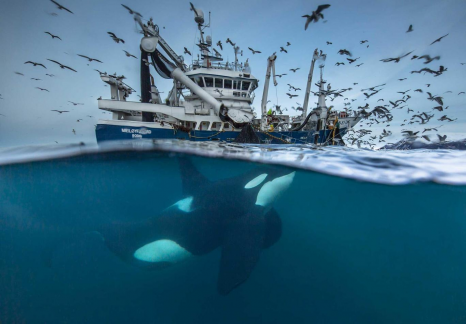
Photo of the Day: Splitting the Catch
Whales in some parts of the world have learned to follow the noise and activity of fishing boats in order to catch any herring near them. When the boats’ nets begin to close, the whales recognize what’s happening and take the opportunity to cut off any herring escaping the nets as they close. It’s sometimes a beneficial relationship for both the whales and the people fishing. Fishermen often locate killer whales and humpbacks to find the schools of herring that reside near them: Photographer Audun Rikardsen captured this photograph in the Arctic water off of Norway. His equipment includes the Canon EOS 5D Mark III with a 11-24mm f/4 lens at 11mm, 1/200 of a second, f/6.3, ISO 640. Read the rest here 21:29
Saving the whales – 19th-century hunting techniques now used to help, not kill humpbacks
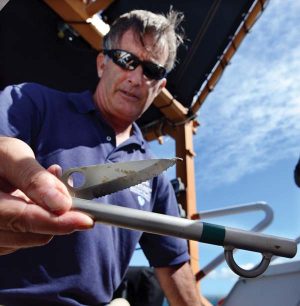 To save whales tangled in netting and debris, rescuers take a page right out of the 1850s whale-hunting playbook. To catch and kill the animals, 19th-century whalers would harpoon the creatures, add a barrel to the line to slow and force them to surface. Then they’d lance captured whales and let them bleed out. Now, rescuers follow similar but nonviolent steps — tossing a hook to catch the debris on a whale, adding a buoy to slow it and using a knife rigged on a pole to cut away entangled fishing gear or other marine debris. Instead of a barrel of oil, their reward is watching the whale swim free. “We stole it from whalers in the 1850s,” said Ed Lyman, large whale entanglement response coordinator with the Hawaiian Islands Humpback Whale National Marine Sanctuary. “Here we are using their technique to actually save whales.” Continue reading the story here 09:58
To save whales tangled in netting and debris, rescuers take a page right out of the 1850s whale-hunting playbook. To catch and kill the animals, 19th-century whalers would harpoon the creatures, add a barrel to the line to slow and force them to surface. Then they’d lance captured whales and let them bleed out. Now, rescuers follow similar but nonviolent steps — tossing a hook to catch the debris on a whale, adding a buoy to slow it and using a knife rigged on a pole to cut away entangled fishing gear or other marine debris. Instead of a barrel of oil, their reward is watching the whale swim free. “We stole it from whalers in the 1850s,” said Ed Lyman, large whale entanglement response coordinator with the Hawaiian Islands Humpback Whale National Marine Sanctuary. “Here we are using their technique to actually save whales.” Continue reading the story here 09:58
Simple solution could save whales from fishing nets
The number of massive whales dangerously caught up in fishing gear could be reduced by three quarters if the industry would agree to use slightly weaker ropes. The calculations and recommendations have been published in the journal Conservation Biology, following a string of whale entanglements reported over June and July; from June, one humpback whale was inadvertently caught up off the British Columbia coast every week for six weeks. Read the rest here 10:49
Fish-stealing whales take bite out of black-cod harvest
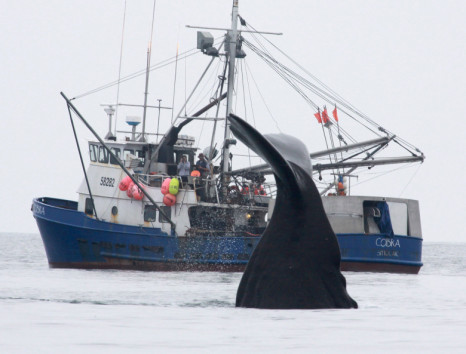 How do you keep a whale from grabbing the fish off your lines? Do you put out decoy buoys to try to trick them? Do you blast heavy metal from the deck of your boat to annoy them, or run for hours in hopes of ditching them? The problem has grown so bad that many favor a radical move: They want to abandon their traditional hooks and lines in favor of baited steel traps — akin to crab pots — that would protect their catch from whales. NPFMC takes this up this week at its meeting. Read the rest here 12:33
How do you keep a whale from grabbing the fish off your lines? Do you put out decoy buoys to try to trick them? Do you blast heavy metal from the deck of your boat to annoy them, or run for hours in hopes of ditching them? The problem has grown so bad that many favor a radical move: They want to abandon their traditional hooks and lines in favor of baited steel traps — akin to crab pots — that would protect their catch from whales. NPFMC takes this up this week at its meeting. Read the rest here 12:33
NEFSC Conducting Protected Species Program Review April 13-16 in Woods Hole, MA
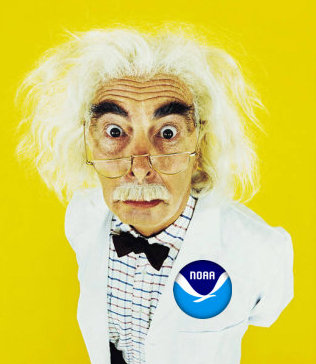 Science programs at NOAA’s Northeast Fisheries Science Center that support protected species conservation and management in the Northeast will be peer reviewed at the Center’s facility in Woods Hole, MA April 13-16, 2015. The species involved include whales, small cetaceans, seals, and sea turtles, as well as fish populations that fall under provisions of the federal Endangered Species Act. Click here for more information on the meeting, including logistics and meeting materials. Read the notice here 13:46
Science programs at NOAA’s Northeast Fisheries Science Center that support protected species conservation and management in the Northeast will be peer reviewed at the Center’s facility in Woods Hole, MA April 13-16, 2015. The species involved include whales, small cetaceans, seals, and sea turtles, as well as fish populations that fall under provisions of the federal Endangered Species Act. Click here for more information on the meeting, including logistics and meeting materials. Read the notice here 13:46New policies, and a court ruling, protect whales from ships in SF Bay and along the Pacific coast from the US Navy.
 Whales, dolphins, and marine mammals in the San Francisco Bay and along the California coast could be better protected by a federal court ruling on US Navy exercises and new policies being put in place to prevent whales from being struck by ships. US District Court Judge Nandor Vadas issued a ruling late yesterday (Wed/25) finding that the National Marine Fisheries Service failed to protect thousands of whales, dolphins, sea lions, seals, and porpoises from Navy training exercises along the Pacific coast. It requires the agency to reconsider permits and whether they violated the Endangered Species Act. more@sfbg 16:13
Whales, dolphins, and marine mammals in the San Francisco Bay and along the California coast could be better protected by a federal court ruling on US Navy exercises and new policies being put in place to prevent whales from being struck by ships. US District Court Judge Nandor Vadas issued a ruling late yesterday (Wed/25) finding that the National Marine Fisheries Service failed to protect thousands of whales, dolphins, sea lions, seals, and porpoises from Navy training exercises along the Pacific coast. It requires the agency to reconsider permits and whether they violated the Endangered Species Act. more@sfbg 16:13


































